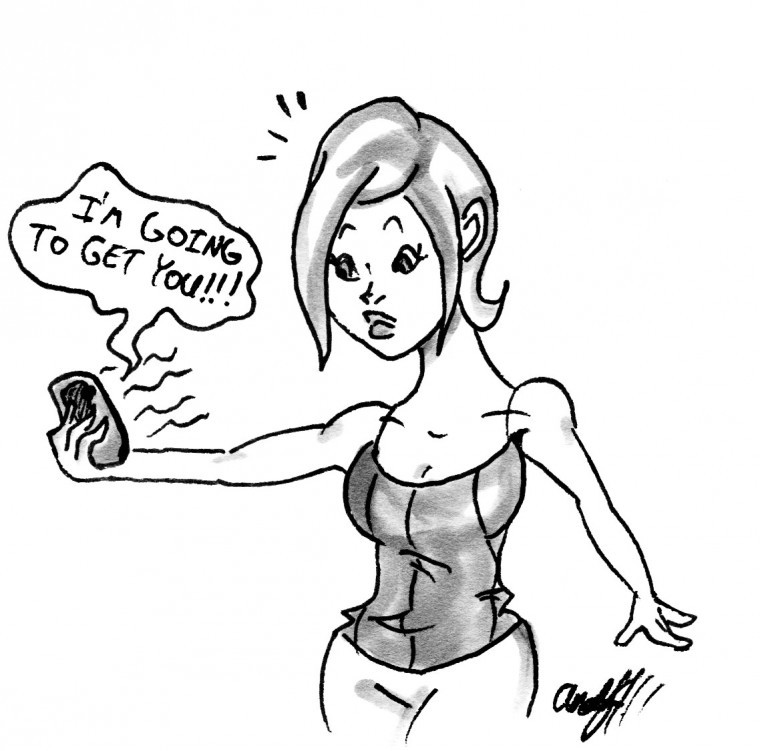Supposed cancer risks won’t deter my cell phone habits
June 9, 2011
I decided I became an adult when I started flossing regularly.
I felt that I had grown out of what psychologists call the superman complex: teenagers believe they are invincible and nothing bad can happen to them. It’s the reason they’re so bad at driving and so good at getting pregnant. It’s the reason I have a sensitive gum line.
As my teenage years ended, I also started wearing sunscreen, even when it’s cloudy. I stopped considering jumping off of bridges just because all of my friends were doing it. Mom and Dad, I’ve stopped rolling my eyes and started listening, but there’s one thing I can’t do: give up my cell phone.
The World Health Organization announced a little over a week ago that cell phones may cause cancer, the first time the agency admitted there could be a link between the two. The WHO categorized cell phone radiation in the same “carcinogenic hazard” group as lead, engine exhaust and chloroform, according to a May 31 CNN article.
But there’s no concrete, long-term evidence that cell phones give you brain cancer; the WHO is waning a little more valley girl (“like, cell phones kind of, like, maybe could give you cancer, I guess”) than saying anything in clear-cut terms.
Is the WHO announcement just an international agency’s version of my parents’ false warning, “Don’t make that face or it’ll get stuck like that?”
Experts say phones give off more radiation when in rural areas, elevators and buildings, so people should avoid making calls in these spaces, according to the article.
DeKalb is semi-rural and cold in fall, winter, spring and a portion of summer. And I’m supposed to avoid using my cell phone inside? Nuh uh.
Like many people who continue to chat on their mobile phone without a second thought, I might have trouble accurately assessing the risk because I can’t see or feel it. I know that Wi-Fi hot spots are more prevalent than not, and at night, you can see the red, rhythmic blinking of a cell phone tower light from pretty much anywhere.
But it’s not like I can see any of this technology floating around like Mike Teevee “split up into millions of tiny pieces…whizzing through the air” in Willy Wonka. It all seems magical, imaginary, harmless.
We’re more aware of risks that seem real; I floss because I can see the decay of stage seven gingivitis on a poster in my dentist’s office. I wear a seat belt because of those terrifying State Farm commercials. I can even visualize my death in 2041 because of some spectacular jet-pack accident, my robot husband whirring with grief at my hospital bedside.
But I can’t picture radiation slowly seeping into my brain and growing a tumor. I can’t imagine what an epidemic of brain cancer would look like years from now.
Or maybe I’m hesitant to believe in cell phone brain cancer because I think, as a society, we’re a little preoccupied with monumental disaster (See: Swine Flu, the recent rapture) and excessive technology (See: app store, 3-D TV).
The only thing we love more than either phenomenon separately is the combination of the two (See: Y2K, any movie with any robot ever). Hollywood, I blame you.
Maybe I’m not afraid because no one else seems to be. Everyone uses a cell phone; everyone can’t be wrong, right? This isn’t like cigarettes, right? Members of my generation can shake their heads knowingly when they look back at old cigarette advertisements that promise a longer life and better health. I imagine future generations might be able to do the same with current cell phone advertisements that show people putting – gasp – a cell phone next to their ear.
I haven’t been convinced of the hazards of cell phone use, but I’m not confident that’s the right decision. I just know that, for now, it’s the convenient one.
So, to my future bionic-human children, if I lay in my death bed because of a cell-phone induced brain tumor 30 years from now, please, let’s not bring up this column and how I ignored the risks all along.
We’ll talk about how awesome my dental hygiene was.







